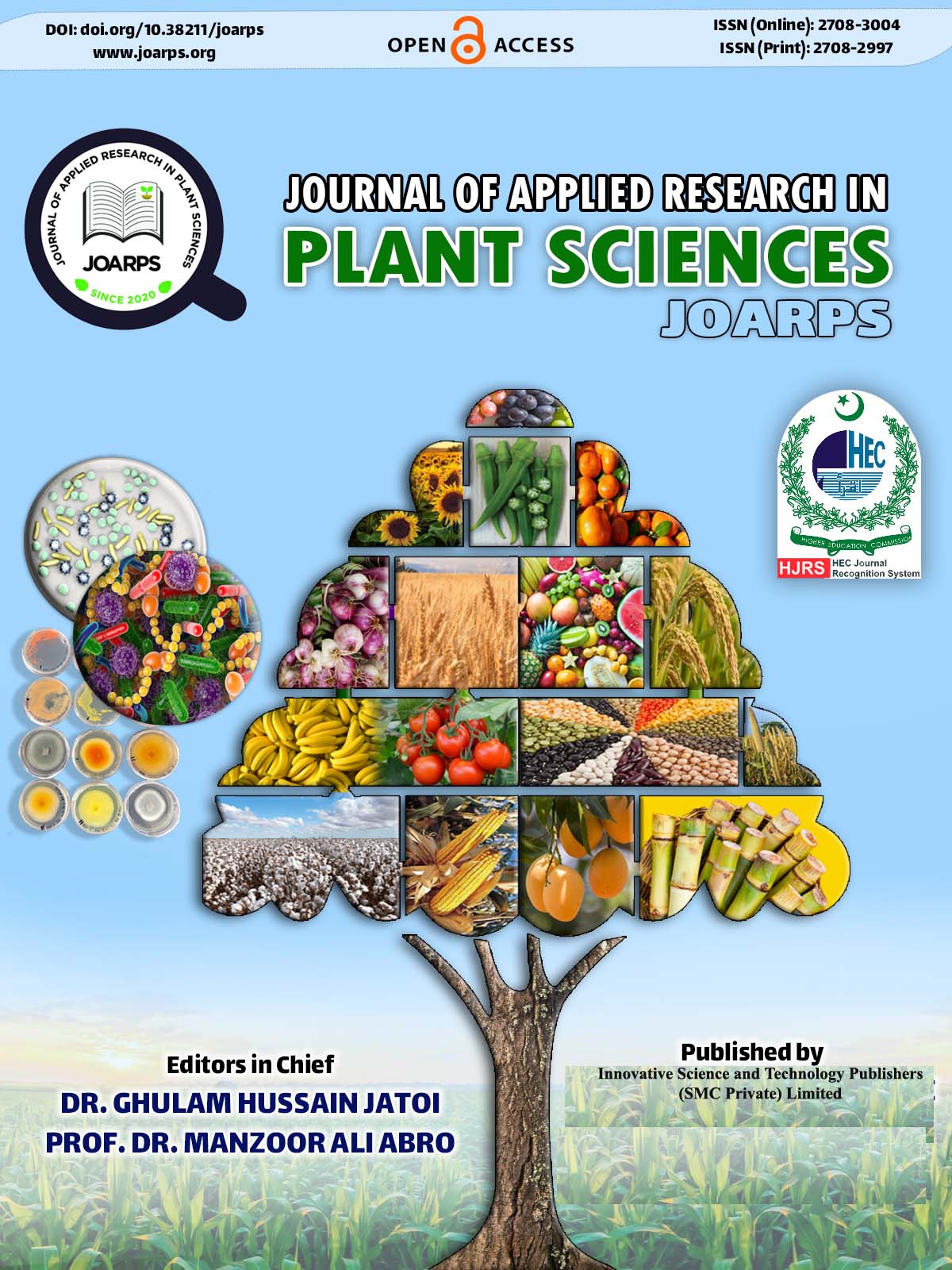About the Journal
The Journal of Applied Research in Plant Sciences (JOARPS) Advancing Innovation in Plant and Agricultural Sciences for a Sustainable Future.
The Journal of Applied Research in Plant Sciences (JOARPS) is a high-impact, peer-reviewed, open-access journal that publishes transformative research across all disciplines of plant and crop sciences, including Agricultural sciences, plant protection, and allied sciences, particularly from Pakistan and other Asian countries. JOARPS provides a global platform for pioneering discoveries that address pressing agricultural challenges, including food security, climate resilience, and ecosystem sustainability.
We welcome original research articles, comprehensive reviews, short communications, and mini reviews that push the boundaries of knowledge in plant and crop sciences, biotechnology, and precision agriculture. All submissions undergo a rigorous double-blind peer-review process, ensuring the highest standards of scientific integrity, methodological rigor, and innovation.
Publication Model & Open Access
- Biannual publication within a single annual volume.
- Immediate open access, ensuring unrestricted knowledge dissemination.
- All articles are published under the Creative Commons Attribution 4.0 International License (CC BY 4.0), allowing unrestricted sharing, adaptation, and use, including for commercial purposes, with proper attribution.
Aims & Mission
JOARPS is committed to accelerating scientific advancements in all disciplines of plant and crop sciences, including Agricultural sciences, plant protection, and allied sciences, particularly from Pakistan and other Asian countries that reshape modern agriculture and plant sciences.
Our mission is to:
✔ Enhance agricultural productivity and crop resilience through cutting-edge research.
✔ Develop sustainable and environmentally responsible agricultural practices to combat climate change.
✔ Promote food security by addressing biotic and abiotic stressors in crop production.
✔ Facilitate interdisciplinary research bridging molecular biology, molecular breeding, biotechnology, artificial intelligence (AI), and agroecology.
While emphasizing Pakistan’s agricultural sector, JOARPS actively welcomes international contributions, fostering a global exchange of knowledge and solutions to contemporary agricultural challenges.
Scope & Key Research Areas
- Cutting-Edge Advances in Plant and Crop Sciences
- Plant Physiology & Biochemistry: Molecular mechanisms regulating growth, metabolism, and stress responses.
- Molecular & Cellular Biology: Functional genomics, transcriptomics, and epigenetics in plant adaptation and development.
- Plant Breeding & Genetics: Breakthroughs in CRISPR gene editing, quantitative genetics, and genome-assisted selection.
- Agroecology & Sustainable Agriculture: Innovations in regenerative farming, biodiversity conservation, and climate-smart agriculture.
- Plant Protection & Crop Health
- Plant Pathology: Emerging plant diseases, pathogen-host interactions, and novel diagnostic tools.
- Entomology & Integrated Pest Management: Sustainable strategies for pest control, vector ecology, and biopesticide development.
- Weed Science: Mechanisms of herbicide resistance and advances in weed management.
- Biological Control & Microbial Interventions: Harnessing beneficial microbes and biocontrol agents to mitigate crop losses.
- Plant-Environment Interactions & Stress Adaptation
- Abiotic Stress Resilience: Genetic and biochemical adaptations to drought, salinity, extreme temperatures, and nutrient deficiencies.
- Biotic Stress Defense Mechanisms: Advances in plant immunity, systemic acquired resistance, and plant-microbe interactions.
- Soil-Plant-Microbiome Dynamics: Harnessing rhizosphere microbiomes to enhance soil fertility and plant health.
- Climate Change Adaptation in Crops: Mitigating the impact of global warming on crop productivity and ecosystem stability.
- Arid and Rainfed Agriculture
- Dryland Farming: Greenhouse farming, hydroponics, and aquaponics in desert areas.
- Drought Management and Adaptation in Plants: Strategies for coping with water scarcity for sustainable crop production in arid regions.
- Low Input Farming: Traditional methods of agriculture with limited use of fertilizers and pesticides
- Organic Agriculture: Bio-fertilizers use, biological insect pests’ control, Neem and herbal extracts, companion planting.
- Drought Resistant Crop Breeding: Developing crops that can tolerate extreme dryness.
- Efficient Irrigation Systems: Drip Irrigation, Picher irrigation, Sprinkler irrigation, Deficit irrigation and other water saving technologies.
- Emerging Technologies & Innovations in Agriculture
- Plant Biotechnology & Synthetic Biology Advancements in RNA interference, metabolomics, and next-generation sequencing.
- Precision Agriculture & AI-Driven Agronomy Application of remote sensing, big data analytics, machine learning, and robotics in smart farming.
- Plant-Derived Pharmaceuticals & Industrial Applications Bioactive compounds, functional foods, and plant-based therapeutics.
- Engineering sciences focusing on any of the plant and animal research.
- Post-Harvest Biology & Food Science Nanotechnology, smart packaging, and novel approaches to food preservation and quality control.
Why Publish with JOARPS?
Global Reach & Scientific Impact: Addressing the grand challenges of agriculture, food security, and environmental sustainability.
Comprehensive & Multidisciplinary Scope: Encompassing all domains of plant and crop sciences, including frontier research in plant protection.
Rapid & Rigorous Peer Review: Ensuring swift publication of high-caliber research while maintaining scientific excellence.
Interdisciplinary Innovation: Connecting biotechnology, AI, and climate resilience research for transformative solutions.
Immediate Open Access: Ensuring unrestricted global access to groundbreaking research.



